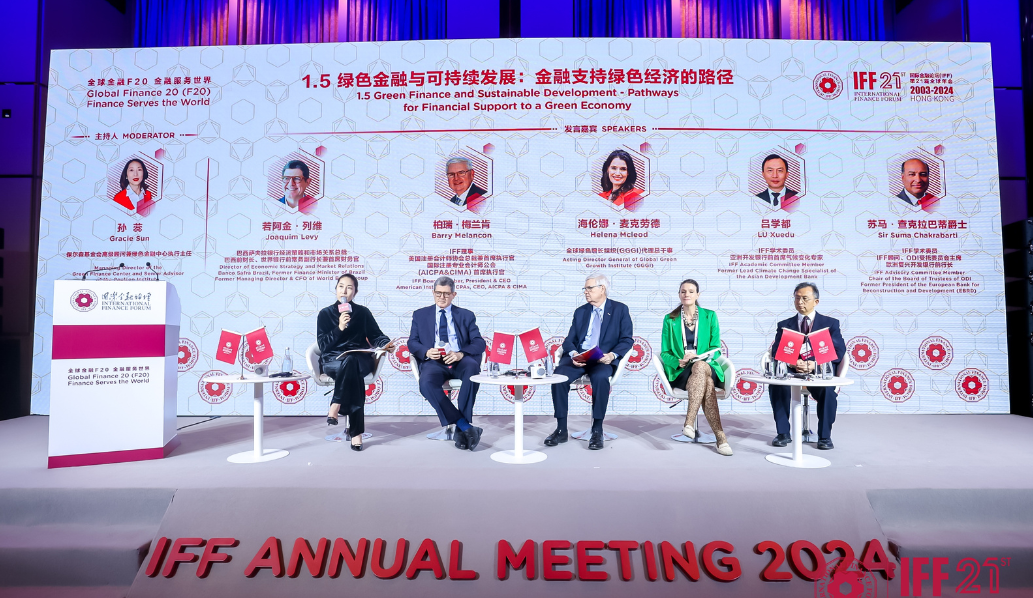On November 22, 2024, the International Finance Forum (IFF) convened its 21st Annual Meeting in Hong Kong, featuring an important sub-forum titled Green Finance and Sustainable Development: Financial Support for a Green Economy. The event brought leaders, renowned experts, and scholars from governments, international organizations, and multilateral development banks to discuss the transformative role of green finance in promoting sustainable economic growth. Key topics supporting the green economy included sustainable disclosure standards, reforms for multilateral development banks, innovation in green financial products, and advancements in regulatory frameworks.
Gracie Sun, Senior Advisor and Managing Director of the Green Finance Center at the Paulson Institute, moderated the forum. The panel featured distinguished participants:
- Joaquim Levy, Director of Economic Strategy and Market Relations at Banco Safra Brazil and former Finance Minister of Brazil
- Sir Suma Chakrabarti, IFF Advisory Committee Member and Chair of the Board of Trustees at the Overseas Development Institute (ODI)
- Barry Melancon, President and CEO of the American Institute of CPAs and CEO of the Association of International Certified Professional Accountants (AICPA & CIMA)
- Helena McLeod, Acting Director General of the Global Green Growth Institute (GGGI)
- Xuedu Lu, IFF Academic Committee Member and former Lead Climate Change Specialist at the Asian Development Bank (ADB)
KEY HIGHLIGHTS & INSIGHTS
The Role of Global Disclosure Standards:
Gracie Sun emphasized the importance of the International Sustainability Standards Board (ISSB) framework in fostering comparability and interoperability across countries. She highlighted that adopting unified sustainability disclosure standards could significantly reduce corporate compliance costs when operating in multiple jurisdictions. Sun also noted the release of China’s Ministry of Finance’s Corporate Sustainability Disclosure Standards draft earlier this year, laying the groundwork for introducing climate-related disclosure standards in a unified national framework.
Boosting Green Finance Through Disclosure:
Joaquim Levy discussed the ISSB’s upcoming climate disclosure requirements (IFRS S1 and S2), which are set for implementation next year. He expressed confidence that standards would compel companies to disclose their carbon footprints and net-zero goals, thus driving funding into green finance and directly influencing global financial markets.
Advancing Integrated Reporting
Barry Melancon underscored the ISSB’s significant contribution to integrated thinking and reporting standards. He emphasized the critical need for global interoperable measurement standards to address climate challenges that would transcend borders. He warned that overemphasizing unique national circumstances could hinder the implementation of global standards. He advocated for measurable, reportable, and globally aligned standards to enhance transparency and accountability through international cooperation.
Strengthening Multilateral Development Banks:
Sir Suma Chakrabarti highlighted the G20 report’s call to reform multilateral development banks to make them “bigger, better, and bolder.” He urged stronger cooperation among emerging economies to channel green finance into sustainable development initiatives.
Challenges in Green Project Financing:
Helena McLeod shared that while many green projects are commercially viable, securing initial funding remains challenging.
Addressing Funding Gaps in Developing Countries:
Xuedu Lu detailed the significant funding gaps developing countries face in addressing climate change. He identified barriers such as regulatory requirements, government policies, and limitations in financial product design. Lu proposed creating favorable regulatory and business environments with explicit legal and policy incentives to attract investments into greenhouse gas reduction and biodiversity conservation projects, ensuring viable returns for investors.
As the impacts of climate change and biodiversity loss become more extreme, the critical role of green finance in advancing sustainable economic development has drawn increasing attention globally. The path of green financing includes financial instruments and products, policy incentives, and risk management mechanisms. Exploring the differences in implementing green finance across countries and regions and discussing the emerging technologies and innovative models that can help achieve a green economy are key to pushing the vital work of green finance forward.
Hero image from left to right: Gracie Sun, Joaquim Levy, Barry Melancon, Helena McLeod, and Xuedu Lu



